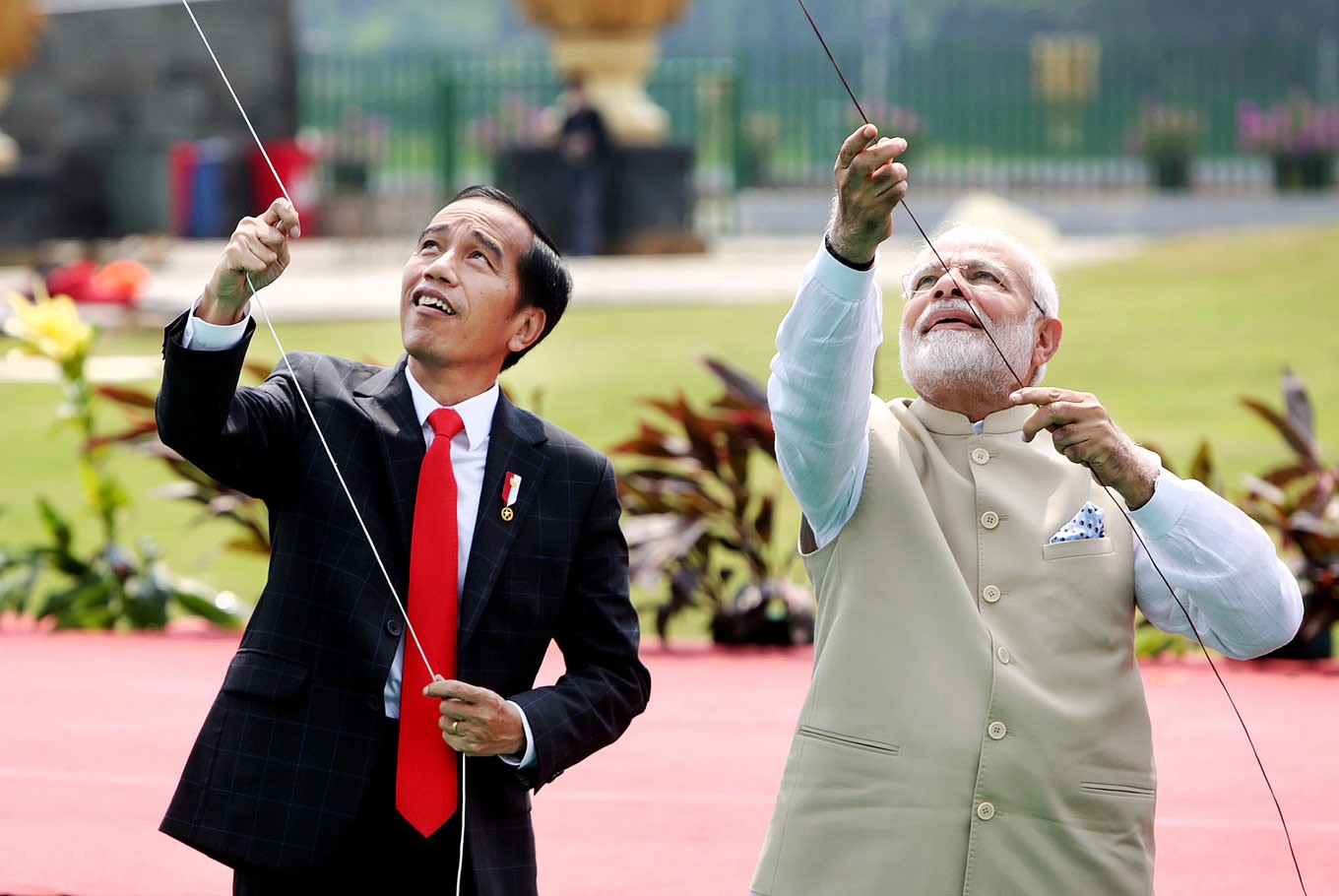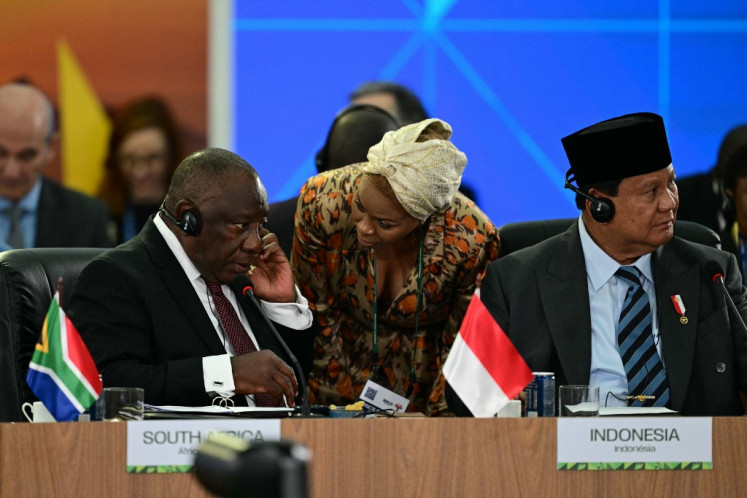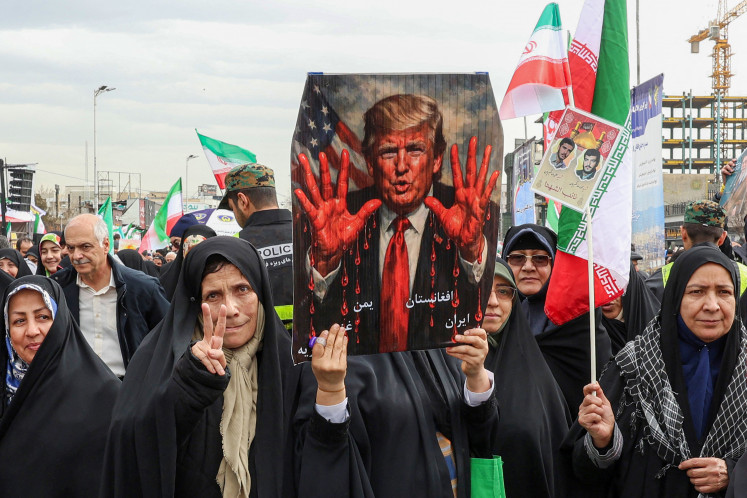Popular Reads
Top Results
Can't find what you're looking for?
View all search resultsPopular Reads
Top Results
Can't find what you're looking for?
View all search resultsBolstering Indonesia-India strategic partnership will be mutually beneficial
Indonesia emphasizes the need to address the challenges China brings in a way that will not push the Southeast Asian country deeper in the binary US-China power competition.
Change text size
Gift Premium Articles
to Anyone
F
or the first time, the INS Sindhukesari, an Indian Navy Kilo class conventional submarine, docked in Jakarta, Indonesia from Feb. 22 to Feb. 24. While it is common for Indian warships to visit Indonesia, the timing, scope, and nature of the visit must be contextualised based on the overarching geopolitical dynamics of the Indo-Pacific to better appreciate and understand the implications of such strategic engagements for the bilateral partnership.
In the context of their geography, India and Indonesia are positioned at critical crossroads in the Indo-Pacific. The southernmost point of India’s Andaman and Nicobar Islands, located at the geostrategic juncture between South and Southeast Asia lies just 90 nautical miles from Indonesia. This crucial intersection is also home to vital Sea Lines of Communication (SLOC) and maritime choke points that serve as the economic lifeline of the region. Being significant maritime powers, Indonesia and India therefore can be considered as the de facto gatekeepers of the region, which is a transit point for an estimated 60 percent of global maritime trade.
Given such strategic stakes, it can only be beneficial for both Indo-Pacific countries to expand and deepen their bilateral partnership to address the turbulent geopolitical and economic shifts taking place in the region today. Evidently, the Indonesia-India strategic partnership today continues to significantly improve not only in scope, but also in depth. However, it is not just material power and the objective reality of geography alone that draws both countries closer, rather, the level of cooperation amid such realities are enhanced due to the increasing convergence of perceptions, concerns, and goals between New Delhi and Jakarta.
Going back to the INS Sindhukesari’s maiden docking in Indonesia, it is necessary to underscore its meaning beyond a face value assessment. Submarines are vital elements of naval sea power, which are known for their ability to effectively contribute to a country’s sea control, sea denial and maritime power projection capabilities. Hence, such a gesture illustrates Indonesia’s growing accommodation for the Indian Navy’s extended operational reach into the Western Pacific. Over two decades ago, Jakarta was wary of India’s growing naval capabilities brought by the lack of awareness and understanding between both sides.
Today, there is a strengthened commitment to bolster the bilateral partnership, particularly in maritime security cooperation throughout the Indo-Pacific. In 2018, both countries elevated their ties to a comprehensive strategic partnership and unveiled a new bilateral naval exercise named Samudera Shakti, which incorporates a war-fighting component to the bilateral strategic partnership. Furthermore, both sides are also looking at developing formidable maritime connectivity in line with India’s Andaman and Nicobar Islands and Indonesia’s island of Aceh.
Both Indonesia and India share similar visions for an inclusive, rules-based, and stable Indo-Pacific, where the centrality of ASEAN remains pivotal. As Jakarta holds the current the ASEAN chairmanship, it seeks to illustrate its leadership role by steering the bloc through a tumultuous regional landscape brought by the intensifying power competition between the United States and China.
As a key Asian middle power and pragmatic leader, Indonesia puts the practical reality of geopolitics at the core of its foreign policy. Recognizing the security threats posed by a rising China, Indonesia continues to spearhead its military modernization programs, while also improving its deterrence capabilities.
Along with taking proactive policies to secure its Exclusive Economic Zone, Indonesia has also improved its defense relations with the US and other key European powers. However, brought by its practicality, Indonesia emphasizes the need to address the challenges China brings in a way that will not push the Southeast Asian country deeper in the binary US-China power competition.
Trying to cut off its largest immediate neighbor by banking on the West is not a recommended policy decision due to the instability it can create. Hence, proactive steps must be taken that reflect the objectivity of the region’s volatile geopolitics.
It is in this context that India serves as a vital partner. India and Indonesia are the largest and third largest democracies respectively. Both have a strong adherence to flexible cooperation based on mutual concerns, interests, goals, and respect for sensitivities rather than rigid bloc politics.
Being an Indo-Pacific power with robust material capabilities and no axe to grind in Southeast Asia, India can complement Indonesia’s desire to secure the region beyond the traditional US-China binary prism.
In fact, given both countries’ distinct and first-hand understanding of China’s assertion, maximizing security relations further will be highly beneficial for both Jakarta and New Delhi at a time when the latter endeavors to play a bigger role as a capacity builder beyond the Indian Ocean region.
Additionally, strengthening security ties between India and Indonesia can serve as a catalyst to incorporate other regional countries into the cooperative framework. Accordingly, the chances of effectively operationalizing key trilaterals between Indonesia and India with other key Indo-Pacific powers such as Australia, Japan, and France remain high.
Furthermore, as Indonesia seeks to play a more pivotal role in the Global South, it will be necessary to enhance ties with India given the latter’s role in key multilateral institutions such as the BRICS, Shanghai Cooperation Organization (SCO), and the Conference on Inter-Action & Confidence-Building Measures in Asia (CICA). In fact, Indonesian Finance Minister Sri Mulyani Indrawati also highlighted Jakarta’s intent to deepen and broaden strategic ties with India to contribute further toward the Global South.
Therefore, given the untapped potential that remains in their bilateral partnership, it will be mutually beneficial for Indonesia and India to maximize the scope of their strategic relationship further given the uncertain future of the Indo-Pacific’s geopolitical configurations.
***
The writer is a Philippines-based geopolitical analyst, and director for South & Southeast Asia at the Philippine-Middle East Studies Association (PMESA).











